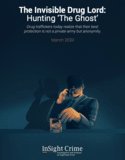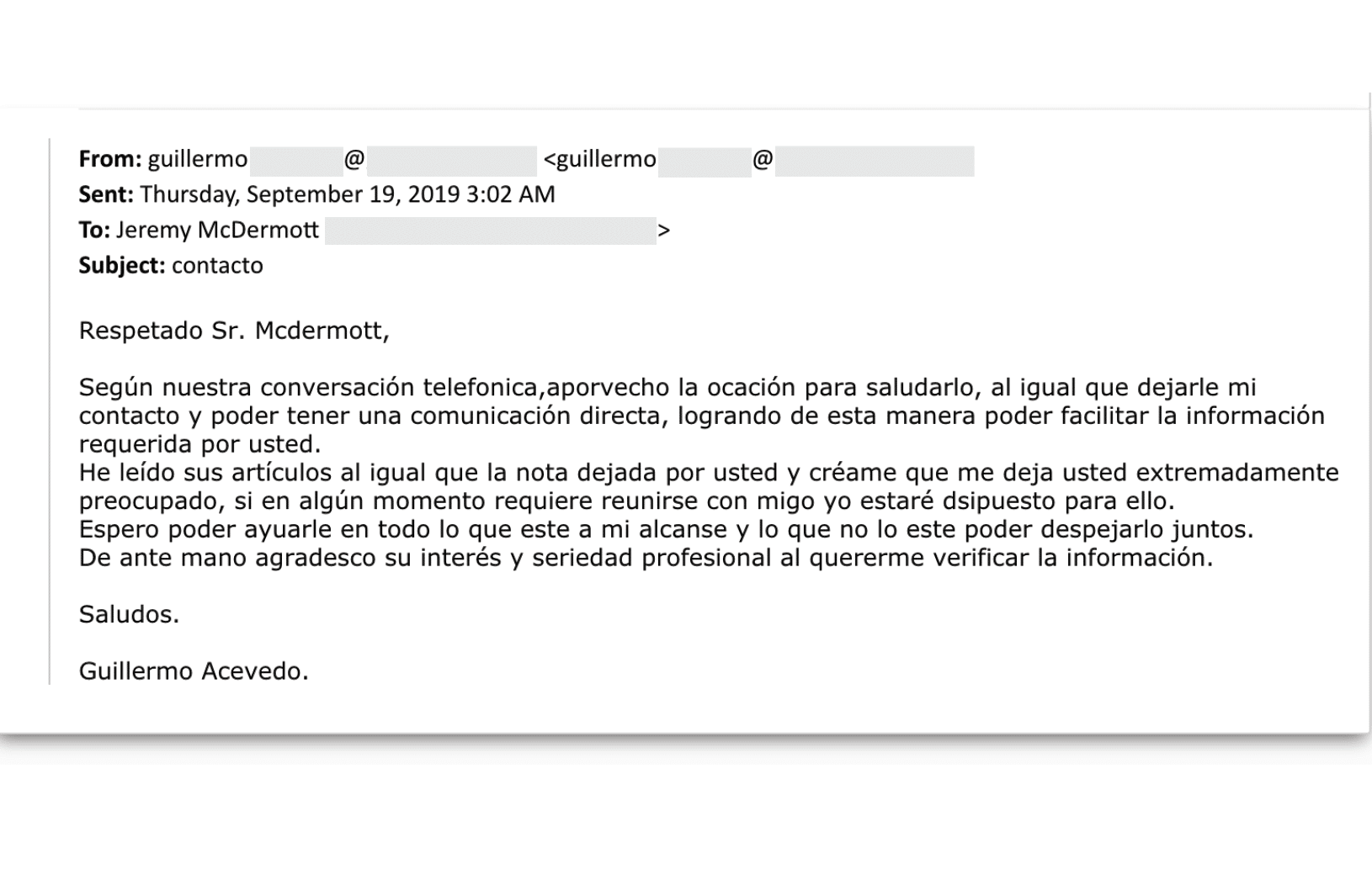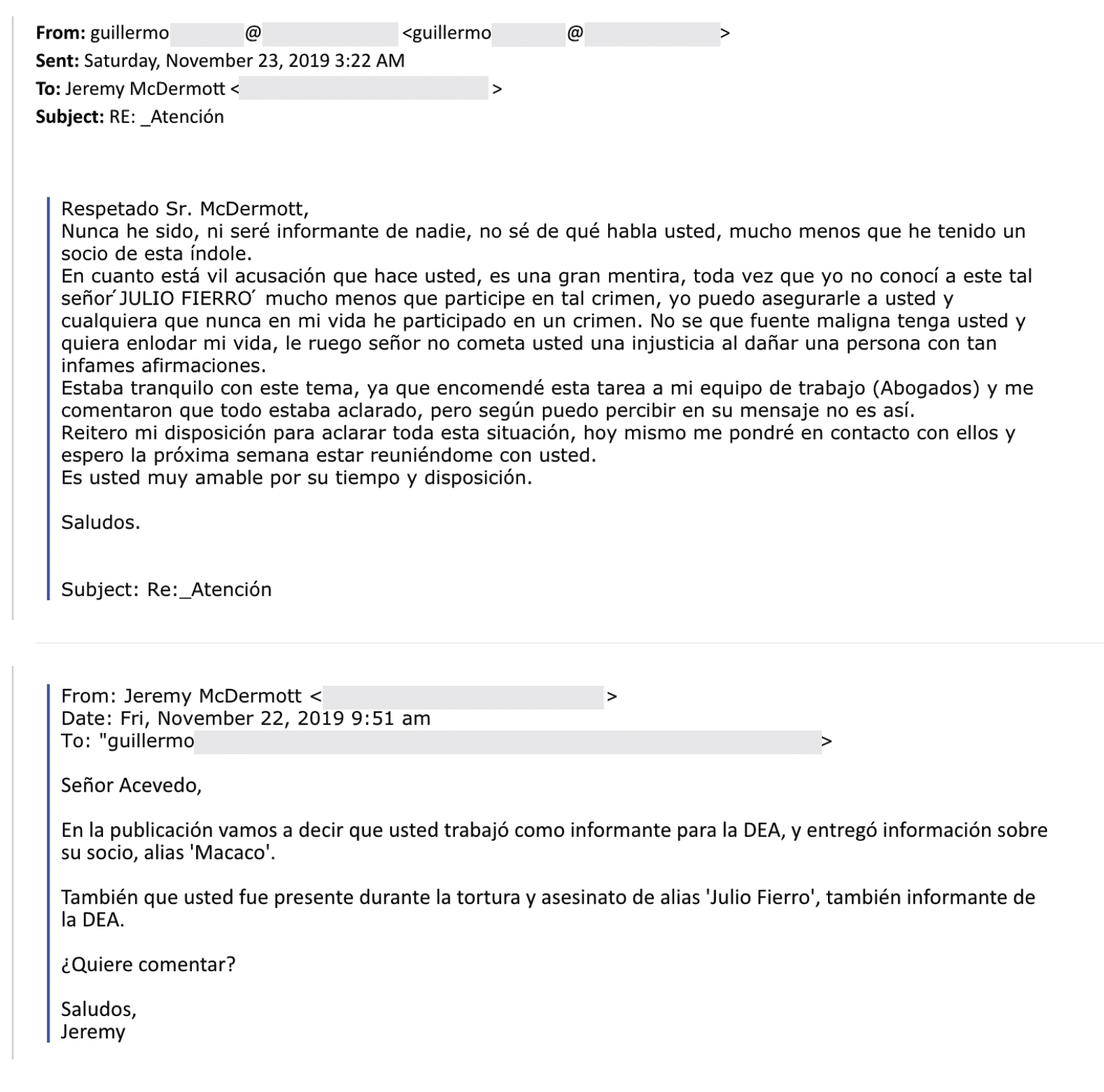The Ghost, a paramilitary drug lord, has moved to Madrid with his millions of drug dollars. He has dodged the Colombian justice system and perhaps secured a pass from the United States after informing. He is free and clear.
A local investigator was able to confirm that “Memo Fantasma,” or “Will the Ghost,” was living in the Spanish capital. He had set up two companies in Spain, both under his real name of Guillermo León Acevedo Giraldo. They had been set up with at least five million euros, but looking at their investments, they were likely worth millions more.
We got a recent photo of him on the streets of Madrid. There was no doubt he was our Ghost.
It was time to go to Spain hopefully to confront Memo, or at the very least deliver a letter laying out our story and giving him the right to reply, before publishing the investigation.

*Drug traffickers today have realized that their best protection is not a private army, but rather total anonymity. We call these drug lords “The Invisibles.” This is the first article in a six-part series about one such trafficker, alias “Memo Fantasma,” or “Will the Ghost.” Read all chapters of the investigation here, or download the PDF.
Speaking to Spanish law enforcement contacts, it seemed Guillermo Acevedo had appeared on their radar, not because of any evidence of criminal activity, but because he had bought property in Spain from two old school Colombian money launderers, Alfonso and Rodrigo Vargas Cuellar, via their company called Bucaramanga. The Vargas brothers formed a criminal structure known as “Las Guaras.” They had been arrested in Madrid in 2003 as part of a huge money laundering network from Colombia to Spain and the United Kingdom, which had washed some $165 million.
Memo’s Madrid Investment Portfolio
As part of his application for a residency visa, Memo had provided an address on Calle Fernández de la Hoz, right in the heart of Madrid. The building had a doorman and the garage exit was on another side of the block. Likely by design, Memo had chosen a property where he could not be surprised.
We also found a house in the outskirts of the city, in a closed neighborhood by a private golf course. Again there was a doorman and no way to peer into the exclusive development. One also couldn’t wait outside without attracting attention and no way to orchestrate a surprise encounter there either.
Even though we had a list of Memo’s vehicles, a Honda ADV 750 motorcycle, a BMW 1200 motorcycle, a Mercedes-Benz A200D and a Range Rover Sport, there was little chance of intercepting him entering or leaving any of his properties.
Memo’s two businesses, Prime Desarrollos Urbanisticos and Promensula Desarrollos, were registered at a law firm, Zurbana & Caracas Abogados, less than 10 minutes’ walk from Memo’s apartment. This seemed like the only option to try to get a phone number or at least leave a right to reply letter in a way he could not deny ever receiving one.
SEE ALSO: The ‘Invisibles’: Colombia’s New Generation of Drug Traffickers
I was welcomed into the office, where everyone seems to know of Guillermo Acevedo immediately, referring to him by his first name. I handed over a business card and confirmed that his companies were registered with them, asking if they might be able to give me a contact number. That was not possible. Could I leave a letter for him? That was fine. I was a journalist on deadline and it was quite urgent that I contact him, would it be possible for them to call him while I waited? Sure.
However, when the lawyer returned from her call, the situation changed dramatically.
“You need to leave now, and we cannot receive any letter,” she declared, beckoning to the door.
I told her this was very strange as this was the address given for his companies. Why would they not let me leave a letter, and what had Mr. Acevedo said that would prompt her to throw me out?
Again, I was asked to leave.
“Is this the kind of law firm which facilitates drug trafficking, money laundering and terrorism, as that is what I am accusing Mr. Acevedo of?” I enquired.
An uproar ensued. I still refused to leave and asked to speak to a senior partner. Another lawyer came in.
“We are not his lawyers,” he said. “We simply do his accounts.”
I asked how this changed things, and did that mean the firm did not represent drug traffickers and terrorists, but simply did their accounts? Amid yet more outrage, I was told they would not answer any more questions unless I returned with the police. My work here was done. Memo would definitely get the message.
The idea was to move quickly and see if we could confront Memo Fantasma at one of his properties before he had time to prepare. At the apartment in central Madrid, the doorman stated that neither Mr. Acevedo nor his family had been around for a while. It seemed the flat was being renovated. He happily took one of the right to reply letters.
The housing complex, on the outskirts of the city was, according to a police contact, popular with soccer players and celebrities, as their privacy was guaranteed. It has just one entrance with a security guard, was surrounded by a private golf course, with no way to peer over fences or take pictures with long lenses.
I presented myself at the entrance and asked for Mr. Acevedo. The guard buzzed the house. Someone replied and the doorman badly pronounced my name. Who was I? A journalist. There was a delay. The reply came back that Mr. Acevedo was not at home. It seemed likely he was in the house. I left another copy of the letter.
We had rattled all the available cages. If Memo Fantasma was going to engage with us, it would be now.
Memo Steps Out of the Shadows
It took two hours for him to call me. I was having a coffee on Madrid’s emblematic Plaza Mayor. The phone rang. I knew it was him even though the caller ID was blocked, as I had just bought a new British SIM card to attempt to convince him that I was based in the United Kingdom, not Colombia. This number had been given to the lawyers and put on the right to reply letters. Nobody else had that number. A feeble security measure, perhaps, but it worked.
The Ghost was furious.
“What kind of person rings up threatening another?” he asked. “The lawyers said that you threatened them.”
I explained what I was doing. He calmed down, then confirmed his full identity. There was no doubt we were speaking to the same Guillermo Acevedo that we had identified in Colombia.
For the next 22 minutes, we played a game where he tried to find out how much I knew and who my sources were, while I tried to get him to agree to see me or make a compromising comment.
When confronted by the accusation, he denied that he was alias “Memo Fantasma” or “Sebastián Colmenares.”
“Where did you get that from? I can assure you, you are wrong,” he said. “I have no criminal record or arrest warrant.”
When I asked him if he had ever been Macaco’s criminal partner, he said no, but he did not ask who Macaco was. When accused of being a paramilitary commander and a member of the Oficina de Envigado, he again denied it but did not ask what those structures were.
When I told him that he was named as Memo Fantasma during testimony given to the Justice and Peace courts, he appeared to be surprised.
“Really? By whom?”
I mentioned the name Pablo Sevillano, but once more he did not ask who that was.
“These people are all criminals, you cannot believe what they say,” he replied. “They are trying to cover their own criminal activities. You are a foreigner, and they are manipulating you.”
His outrage turned to supplication.
“I have a wife and children, and these allegations will affect them.”
I thought of the wives and children of tens of thousands of paramilitary victims.
I assured him that we were not targeting his family in any way.
The issue then switched to money. He insisted he was not a rich man. I mentioned two of his properties in Madrid, the ones we had already visited. He said he had mortgages on both. When asked about the vehicles registered to his company and himself, he was also evasive. He offered to share his bank records which would apparently reveal a dire state of affairs.
I then switched to his business interests in Colombia. When asked about his ownership of the helicopter company at Medellín’s Olaya Herrera airport and involvement in the Torre 85 development in Bogotá, he admitted to both.
I mentioned the fact that Colombian police and US authorities had records on him, even though they may have been wiped, and that we thought he might have been a US informant.
“It is impossible to wipe records in the United States,” he replied.
He did not address the issue of being a US informant. Then he asked if I had seen his US records, which I have not, since they are sealed.
He then appealed to journalism ethics.
I replied that if he could persuade me that he was not Memo Fantasma or Sebastian Colmenares, I would spike the story immediately.
He refused to meet, insisting he was not in Madrid. But he promised to send me an email.
At the end of the call, I was more convinced than ever that this Guillermo Acevedo was our Ghost. He seemed to know exactly who I was talking about and what I was talking about. A normal businessman would not know these things and would have been confused by all the mentions of Colombian underworld figures.
I was not expecting to ever hear from Memo again, at least not until after publication and then only through his lawyers. However, soon after, I received an email.

English Translation (accounting for frequent spelling errors in the Spanish original) :
Dear Mr. Mcdermott,
According to our telephone conversation, I take this opportunity to greet you, as well as leave you my contact details in order to have direct communication, ensuring in this way being able to provide you the information you require.
I have read your articles as well as the letter you left and believe me that you have made me extremely worried, if at any time you need to meet with me I would be ready to do so.
I hope to be able to help you in anything that may be in my power and to jointly resolve the rest.
Ahead of time, I appreciate your interest and professionalism in wanting me to verify the information.
Regards.
Guillermo Acevedo.
The email was the first of many communications we would exchange. He promised to talk, to sort things out and to meet. I offered possibilities. But it soon became clear he was simply stalling. The communications revealed little except that Memo Fantasma, while having a brilliant criminal mind, had received little formal schooling.
A Call From the Vice-President of Colombia
I returned to Colombia the day after speaking to The Ghost. On landing in Medellín, I turned on my phone. There I found a message from Vice President Marta Lucía Ramírez saying that we needed to talk. This could not be a coincidence. When we got on the phone, she got right to the point.
“I know what story you are working on,” she said.
Now at any one time, InSight Crime is working on a dozen different investigations, but I have found it is usually better to be direct with vice presidents.
“Who told you?” I asked.
“A source in Washington,” she replied.
“Did you help Mr. Guillermo Acevedo get his daughters into the Nueva Granada school?”
“No.”
“Did you know him well?” I insisted.
“No. He is simply someone that my husband did business with. Not only that but we got General Naranjo to do a background check on him. My husband is available to answer all of your questions and is expecting your call.”
Before speaking to her husband, Álvaro Rincón, I spoke to retired General Óscar Naranjo, former Colombian police chief and vice president, whom I know from years of reporting in Colombia. He totally handled me.
SEE ALSO: Coverage of Elites and Organized Crime
“Now I do not remember this specific case, but if the Vice President said it happened, then it happened. People were asking me all the time to do background checks,” he said.
I asked him if he had heard about Memo Fantasma, and he said he had, but as a small-time player. I asked if he knew that Memo was also Sebastián Colmenares, a leader of the paramilitary United Self Defense Forces of Colombia (Autodefensas Unidas de Colombia – AUC).
“No, that I did not know,” he responded.
I asked him if he would mind checking with some of his contacts to see if he could come up with anything about this person. He said he would make some inquiries. Despite some gentle nudging over several weeks, I got nothing. But the former police chief and vice president is a very busy man.
During this time, as well as fact-checking everything for publication, we sought to find any evidence of continuing criminal activity on the part of Memo Fantasma. While his money laundering activities were clear, the question was if they were just for his own funds or whether he was providing “washing” services to other criminals. The fact that he was associating with known Colombian criminals and money launderers in Spain pointed to the latter. Looking deeper into his business dealings in Spain, particularly a series of development projects in Seville, it was clear that tens of millions of euros were at play. We think that he had certainly earned that kind of money over his career, but there was also enough room to be taking substantial sums from other players.
”Ernesto,” a Medellín drug trafficker who had also worked with the paramilitary army, insisted The Ghost was still in business. He knew nothing of our discoveries.
“Now he is part of a group called ‘The Fraternity’ [La Fraternidad],” Ernesto said. “There are three or four of them. They pretend they are businessmen, run in high society, involved with big construction projects. What everyone forgets is that these guys are pure narcos, but masquerade as legit businessmen.”
He also suggested that even with his former protectors, Carlos Mario Jiménez, alias “Macaco,” and Carlos Mario Aguilar, alias “Rogelio,” long gone, he still had contacts in the Oficina de Envigado to get his dirty work done.
“Alias ‘Charlie’ is his accountant and his chief of bandits was alias ‘Draculín’ [Dracula], who also collected his payments,” Ernesto added.
We were unable to find “Charlie,” but Draculín was well known in the Medellín underworld. His real name is Héctor Alexis Muñoz and was among the most wanted in Medellín until his capture in 2018.

Ernesto also sought to tie Memo to a famous killing, that of Julio César Correa Valdés, alias “Julio Fierro,” a drug trafficker who was apparently cooperating with the US Drug Enforcement Administration (DEA). He disappeared in August 2001, and former paramilitaries testified that he was tortured and killed. Ernesto stated that Memo had paid for the killing and been present during the torture. No other source confirmed it, and indications were that he had been killed on the orders of the AUC chief, Carlos Castaño. However, in a last attempt to provoke Memo to engage, I sent him a note asking him about it and about being an informant for the US himself.
English Translation of e-mail from Jeremy McDermott to Guillermo Acevedo on Nov. 22, 2019:
“Mr. Acevedo,
In the publication, we will state that you worked as an informant for the DEA and delivered information about your partner, alias ‘Macaco.”
Also that you were present during the torture and assassination of alias ‘Julio Fierro,’ also a DEA informant.
Do you wish to comment?
Regards,
Jeremy.”
English Translation of e-mail from Guillermo Acevedo to Jeremy McDermott on Nov. 23, 2019 (accounting for frequent spelling errors in the Spanish original):
“Dear Mr. McDermott,
I have never been, nor will I be an informant for anyone, I do not know what you are talking about, much less that I have had an associate of that nature.
Concerning this vile accusation you have made, it is a big lie, I have never known this gentleman ‘JULIO FIERRO’ far less have I taken part in such a crime, I can assure you and anybody that I have never in my life taken part in a crime. I do not know what evil source you may have which wishes to sully my life, I beg of you sir to not commit an injustice by harming a person with such infamous claims.
I was relaxed about this topic, as I entrusted this task to my team (Lawyers) and they told me everything was cleared up, but I now see in your message this is not the case.
I reiterate my willingness to clear up this entire situation, I will be in touch with them today and I hope to meet with you next week.
You are very kind for your time and availability
Regards.”
We abandoned any further efforts to get Memo to talk.
Last Man Standing
As all this was happening, it was announced that Memo’s former paramilitary partner, Carlos Mario Jiménez, alias “Macaco” — who had been sent back from the United States after serving 11 years in prison — had been refused admission to Colombia’s paramilitary amnesty programs. That meant that he was looking at up to 40 years in prison in Colombia, as he had already been charged with drug trafficking, massacres and murders.
Yet it was Memo Fantasma who handled much of Macaco’s drug trafficking activity. It was Memo Fantasma, who as the financial brains behind Macaco’s operations, funded the military machine of the Central Bolívar Bloc that carried out massacres, mass displacements and rapes across large swathes of Colombia.
Looking at the criminal network connected to Memo Fantasma, one thing stands out. Almost all have been killed or been to prison. Yet Guillermo Acevedo is living the high life in Madrid, utterly unmolested. For more than 30 years, one of Colombia’s more prolific drug traffickers has remained invisible.
*Investigation for this article was conducted by Ángela Olaya, Ana María Cristancho, Laura Alonso, Javier Villalba, Juan Diego Cárdenas and María Alejandra Navarrete.






